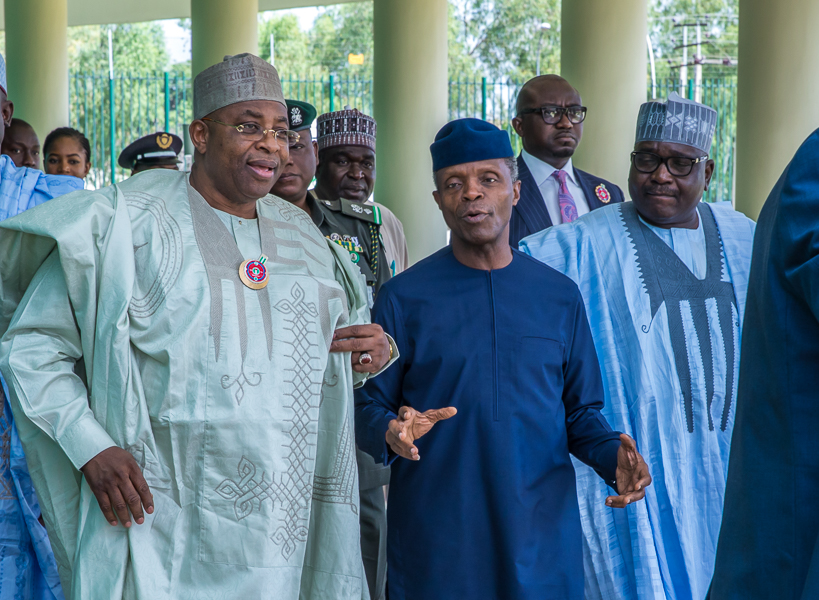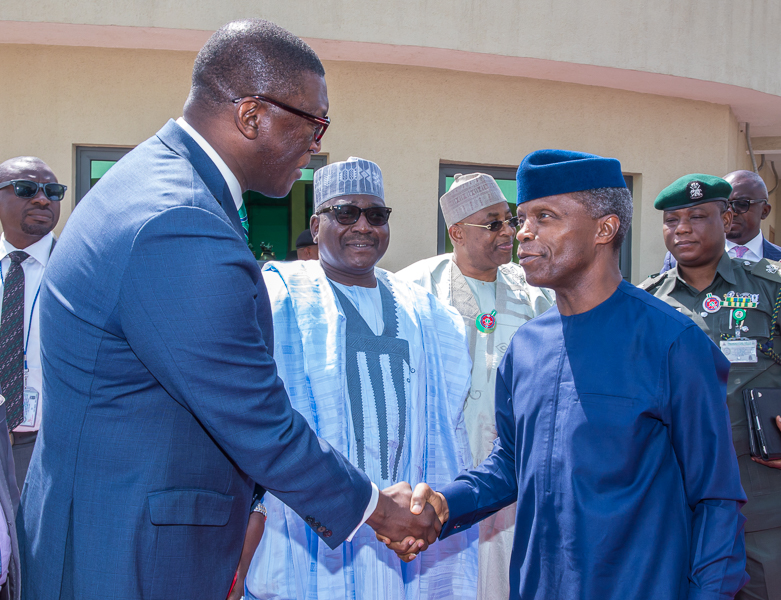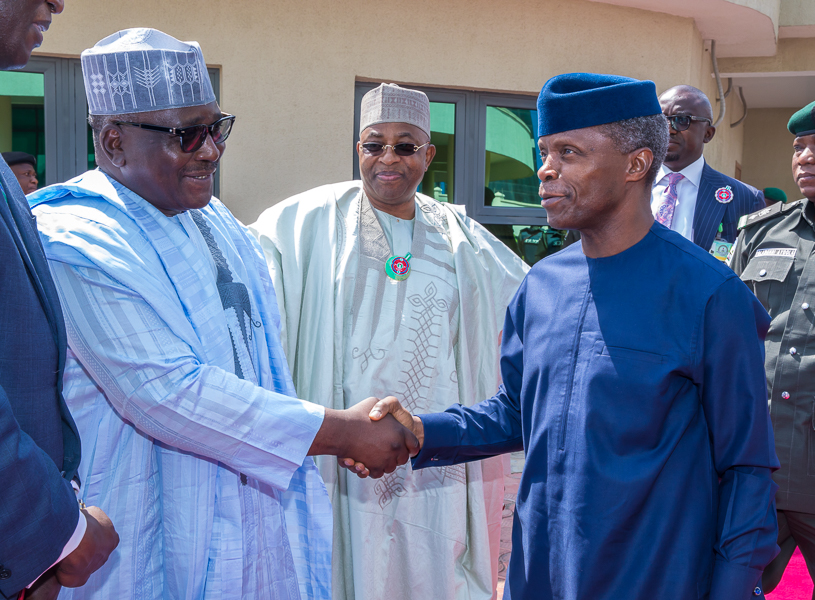Launch Of The Inclusive Basic Service Delivery & Livelihood Empowerment Integrated Project
SPEECH BY HIS EXCELLENCY, PROF. YEMI OSINBAJO, SAN, GCON, VICE PRESIDENT OF THE FEDERAL REPUBLIC OF NIGERIA, AT THE LAUNCH OF THE INCLUSIVE BASIC SERVICE DELIVERY AND LIVELIHOOD EMPOWERMENT INTEGRATED PROJECT (IBSIP), 6TH DECEMBER 2018.
Protocols
I am delighted to be here today for the launch of the Inclusive Basic Service Delivery and Livelihood Empowerment Integrated Project (IBSIP), a landmark intervention in one of the most serious challenges Nigeria has ever faced.
Over the last decade, more than 20,000 persons have been killed, $9billion in destroyed infrastructure, including more than 400,000 houses and thousands of schools, hospitals and other public buildings as well as more than 2million Nigerians displaced from their homes and communities.
But the devastation is only a part of the narrative; it is definitely not the entire story. There are the countless stories of heroism and resilience, from the victims of the insurgency, from the troops of the Nigerian Armed Forces, and the Civilian JTF, all of who are out there fighting and sacrificing a great deal to keep us safe. For me, these stories of resilience and hope and optimism deserve a lot more attention than they’re currently getting.
And the event we’re gathered here for is for all of these people: all of those citizens and communities refusing to be cowed by a band of conscience-less criminals and striving to rebuild their lives against the backdrop of improving security.
According to the latest edition of the Global Terrorism Index, the number of deaths caused by Boko Haram has dropped 83 percent from the peak in 2014. The roads and schools that were all closed a few years ago are now open. This year alone the Nigerian Army’s Operation Last Hold has helped 35,000 people to voluntarily return to their homes and communities and commence the task of rebuilding lives and livelihoods. But we are confident that the worst is now well behind us. And the President as Commander-in-Chief is determined to decisively address the recent escalation in terrorist activities. Already the Chiefs of Army and Air Staff are relocating to the Northeast, to oversee a scaling-up of our efforts to end the insurgency completely.
This, as you all know, has always been the President’s promise – to defeat Boko Haram and end the insurgency, and to rebuild and restore the Northeast. But there remain significant challenges especially to lives and livelihoods in the Northeast, which is why we are here.
Right from its inception, our administration has demonstrated the commitment to rebuilding the Northeast. In 2016, we unveiled the Buhari Plan; a comprehensive blueprint for the recovery and reconstruction of the region. The Plan established the Presidential Committee on the Northeast Initiative (PCNI) to coordinate all efforts by state and non-state actors, domestic and international, to comprehensively address the economic, social and humanitarian crises in the region.
At the core of our efforts is the conviction that humanitarian interventions are not by themselves enough to bring about a radical transformation of the circumstances of the Northeast Region. We believe in an approach that combines both humanitarian and developmental interventions, which means combining short-term remedies targeted at vulnerable populations with solutions that look well ahead into the future and address medium and long-term challenges. In other words, the ideal approach is the one that addresses today’s issues while simultaneously anticipating and devising solutions for tomorrow’s issues; such an approach not only wins the war but secures the peace as well.
In practical terms, this has meant taking steps to reinvigorate social services such as the provision of health care and education, the restoration of civil authority in liberated areas, and the promotion of livelihoods and human security.
This is where the Inclusive Basic Service Delivery and Livelihood Empowerment Integrated Project (IBSIP), comes in. As more people return to their homes, the provision of essential services and job creation in safe locations will play a great role in ensuring that these returnees can get the basic tools and skills that they need to begin to rebuild their lives. The IBSIP, which will be implemented by the Federal Government of Nigeria and the African Development Bank (AfDB), is, therefore, an intervention focused on investing in infrastructural restoration, the reactivation of social services and the rejuvenation of livelihoods alongside the culture of enterprise, which is necessary for sustainable post-conflict communities.
Our goal is to achieve, through this project, transformative improvements in water security and sanitation, food security, hygiene, nutrition, the provision of primary health care, basic education, access to markets, entrepreneurship and job creation.
We are particularly interested in empowering the youth, women and the vulnerable in ways that are not typical of such interventions. This is because for us as an administration, we recognize that a commitment to transform Nigerian lives is invariably a commitment to transform the lives of the weakest and most vulnerable persons in our country.
The Buhari Plan identifies key areas of critical impact, which guide the design of intervention programmes in the Northeast. I am happy to note that the AfDB has, in the design and implementation of the IBSIP, keyed into the Buhari Plan, and is funding projects that will benefit an estimated 14million affected people, including over 2.3million Internally Displaced Persons.
In line with our administration’s focus on the vulnerable, 80 percent of the target beneficiaries are women, children and youth. We are also paying special attention to rural households in the Local Government Areas affected by the insurgency.
It has been gratifying to note how enthusiastically, our friends and partners have rallied to our support, mobilizing resources to tackle the crisis in the Northeast. The AfDB is investing roughly $258 million in the effort to activate critical impact areas of recovery in the Northeast identified in the Buhari Plan.
We would like to express the profound appreciation of the Federal Government to the Bank for being a partner in progress with us. When the story of the region’s recovery is told, the work of the AfDB will occupy a well-merited and prominent chapter.
I would also like to highlight one very important on-going project of ours, which I think demonstrates very clearly, the size of the creative potential available to tap into for solving the problems that confront us. That project is the Innovation Hub Programme (NSIP-Hubs), established under the National Social Investment Program, which is the largest social intervention programme in Nigeria’s history, and also the largest in existence on the African continent.
The goal of the Hubs’ Programme is to promote innovation across all geopolitical regions of the country and to do this in a way that specifically addresses the unique challenges faced in each location. As you all know, the primary challenges peculiar to Northeast Nigeria are related to the insurgency, and the most urgently needed solutions, therefore, are those suited to a region emerging from a period of conflict.
And so earlier this year, we opened a Northeast Humanitarian and Innovation Hub in Yola, Adamawa State. The results have been exciting and inspiring, confirming our belief that Nigeria’s young people are its greatest resource.
Since launch, the Hub has hosted a Northeast Makeathon Challenge, to which 1,500 teams of innovators from across the Northeast and the entire country applied. 25 successful applicants were selected for a Boot camp in Yola, at which they came up with innovative solutions to identified challenges in the region, ranging from early recovery, education, health, food security, protection and camp coordination and management. These innovators have since gone on to commence implementation of their solutions in the region.
One of them is a young man, Gbenga Ogundare, who has a solution to power Internally Displaced Persons camps and host communities using Bio-gas technology, which involves setting up something called a ‘bio-digester.’ A pilot of Ogundare’s project will be demonstrated at the Malkohi Resettlement Camp in Yola.
Following her participation in the Bootcamp, Zainab Lawan of ZDAL Dignity kit, returned to Borno state where she has, in collaboration with partners, successfully distributed over 10,000 dignity kits to women and young girls. These kits are helping restore safe, hygienic sanitary practices to women during their monthly cycles.
There’s also Nathan Williams, a mechanical engineer who has fully tested his light-duty multi-purpose farm machinery, equipped to serve as a planter, harvester, tiller, borehole drilling, irrigation and seed processing machine. With more funding, he will set up commercial-scale production of the machinery and help bring mechanized farming to rural communities.
A notable achievement of the programme is training interns to design for and operate 3D printers. One of their model projects is one that will produce prosthetic limbs for child amputees who lost their limbs due to the insurgency.
These are just a few of the stories being created out of the Northeast Innovation Hub. These stories and many more, keep us focused, hopeful and excited about what the future holds. There is no limit to what we can achieve when we work together, empower our young people, and do not allow what is happening now distract us from envisioning what could be.
And that, I believe, is what the IBSIP is all about – an investment in a future that is much greater than the present. Someday very soon, I am confident that we will all be able to look back to this moment as a turning point in the trajectory of Northeast Nigeria.
I thank you all for listening.




